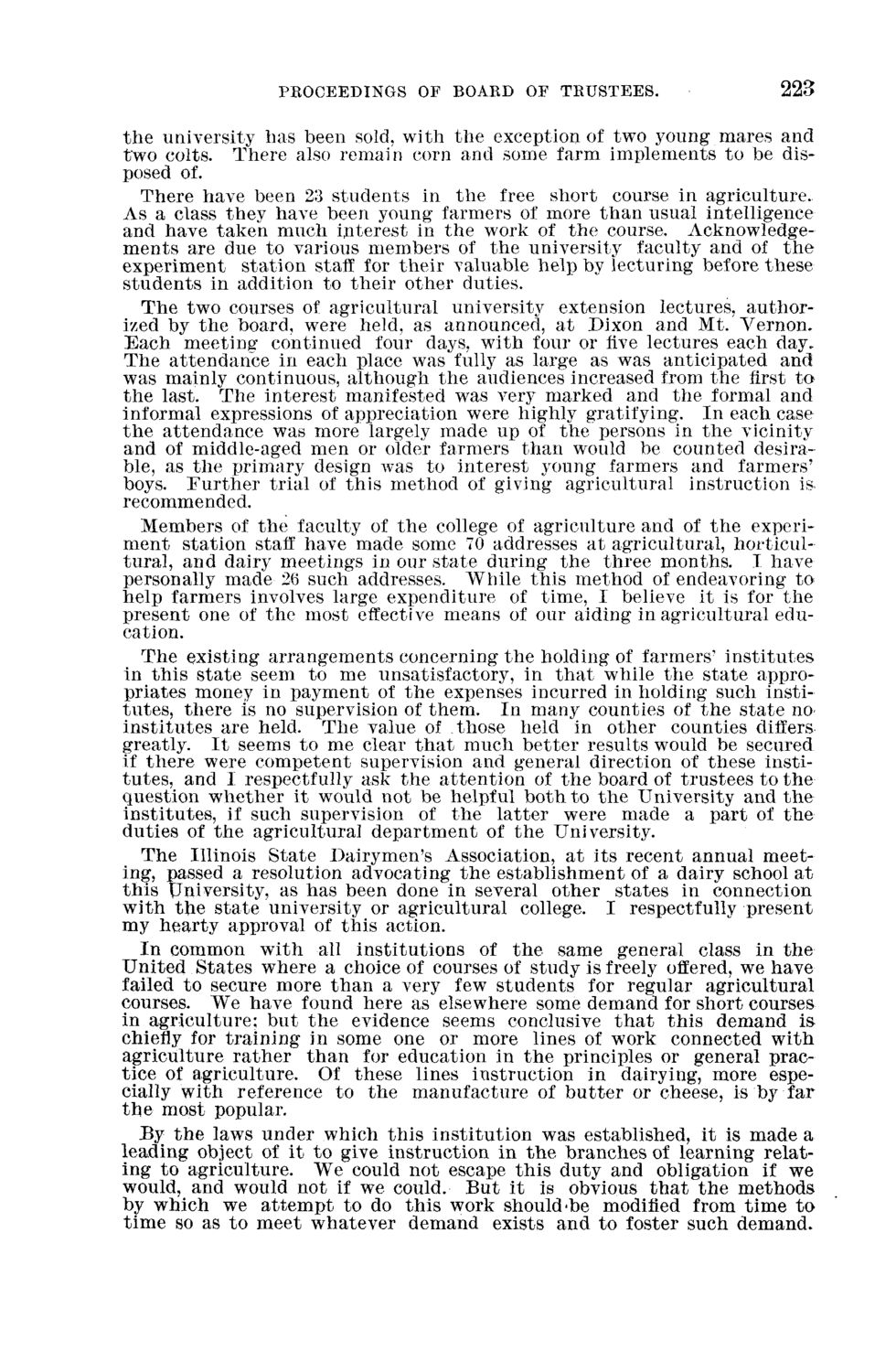| |
| |
Caption: Board of Trustees Minutes - 1894
This is a reduced-resolution page image for fast online browsing.

EXTRACTED TEXT FROM PAGE:
PROCEEDINGS OF BOARD OF TRUSTEES. 223 the university has been sold, with the exception of two young mares and two colts. There also remain corn and some farm implements to be disposed of. There have been 23 students in the free short course in agriculture. As a class they have been young farmers of more than usual intelligence and have taken much interest in the work of the course. Acknowledgements are due to various members of the university faculty and of t h e experiment station staff for their valuable help by lecturing before these students in addition to their other duties. The two courses of agricultural university extension lectures, authorized by the board, were held, as announced, at Dixon and Mt. Vernon. Each meeting continued four days, with four or five lectures each day. The attendance in each place was fully as large as was anticipated and was mainly continuous, although the audiences increased from the first to the last. The interest manifested was very marked and the formal and informal expressions of appreciation were highly gratifying. In each case the attendance was more largely made up of the persons in the vicinity and of middle-aged men or older farmers than would be counted desirable, as the primary design was to interest young farmers and farmers' boys. Further trial of this method of giving agricultural instruction is recommended. Members of the faculty of the college of agriculture and of t h e experiment station staif have made some 70 addresses at agricultural, horticultural, and dairy meetings in our state during the three months. I have personally made 26 such addresses. While this method of endeavoring to help farmers involves large expenditure of time, I believe it is for the present one of the most effective means of our aiding in agricultural education. The existing arrangements concerning the holding of farmers' institutes in this state seem to me unsatisfactory, in t h a t while the state appropriates money in payment of the expenses incurred in holding such institutes, there is no supervision of them. In many counties of the state noinstitutes are held. The value of those held in other counties differs greatly. I t seems to me clear t h a t much better results would be secured if there were competent supervision and general direction of these institutes, and I respectfully ask the attention of the board of trustees to the question whether it would not be helpful both to the University and t h e institutes, if such supervision of the latter were made a part of the duties of the agricultural department of the University. The Illinois State Dairymen's Association, at its recent annual meeting, passed a resolution advocating the establishment of a dairy school at this University, as has been done in several other states in connection with the state university or agricultural college. I respectfully present my hearty approval of this action. In common with all institutions of the same general class in the United States where a choice of courses of study is freely offered, we have failed to secure more than a very few students for regular agricultural courses. We have found here as elsewhere some demand for short courses in agriculture; but the evidence seems conclusive t h a t this demand is chiefly for training in some one or more lines of work connected with agriculture rather than for education in the principles or general practice of agriculture. Of these lines instruction in dairying, more especially with reference to the manufacture of butter or cheese, is by far t h e most popular. By the laws under which this institution was established, it is made a leading object of it to give instruction in the branches of learning relating to agriculture. We could not escape this duty and obligation if we would, and would not if we could. But it is obvious t h a t the methods by which we attempt to do this work should-be modified from time to time so as to meet whatever demand exists and to foster such demand.
| |